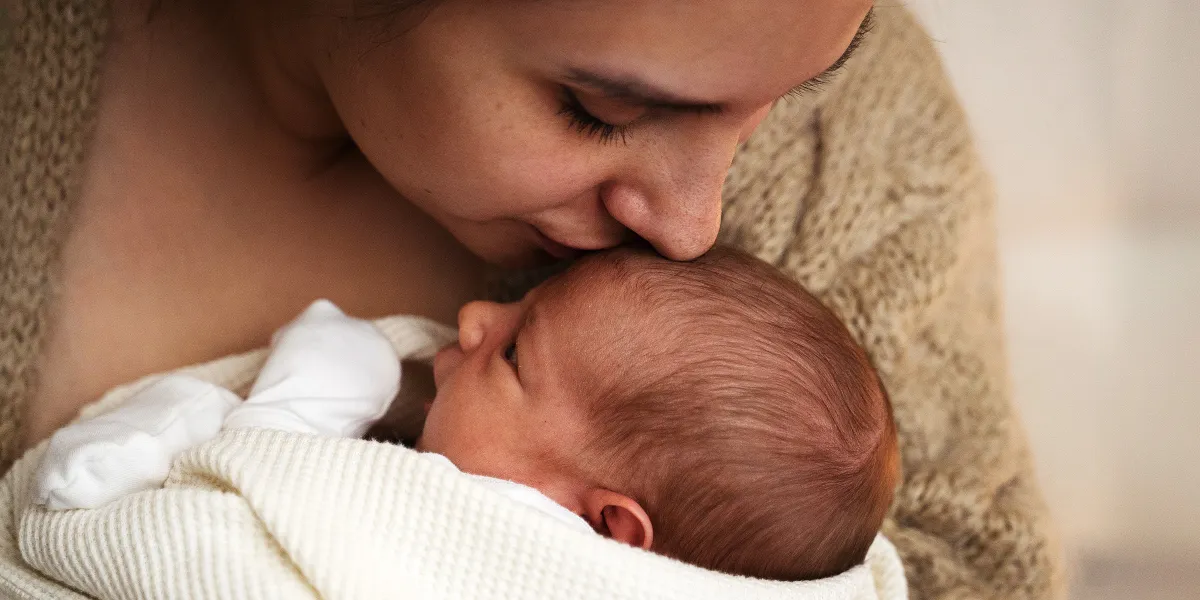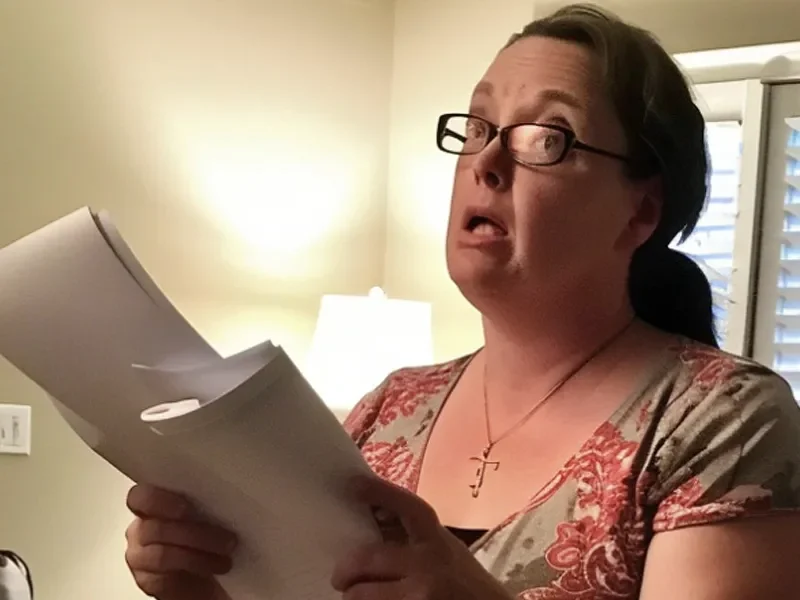When I brought my newborn to the ER in the middle of the night, I was exhausted and scared. I didn’t expect the man sitting across from me to make it worse or for a doctor to change everything.
My name’s Martha, and I’ve never felt this tired in my life.
Back in college, I used to joke that I could survive on iced coffee and bad decisions. Now it’s just a lukewarm formula and whatever’s left in the vending machine at 3 a.m.
That’s where life has me these days, running on instinct, caffeine, and panic. All for a little girl I barely know, but already love more than I’ve loved anything.
Her name is Olivia. She’s three weeks old. And tonight, she wouldn’t stop crying.
We were in the ER waiting room, just the two of us. I was slouched in a hard plastic chair, still wearing the stained pajama pants I’d given birth in — not that I cared how I looked.
One arm cradled Olivia against my chest, the other tried to steady her bottle as she screamed.
Her tiny fists balled up near her face, legs kicking, voice hoarse from hours of crying. The fever had come on suddenly. Her skin felt like fire. That wasn’t normal.
“Shh, baby, Mommy’s here,” I whispered, rocking her gently. My voice was cracked, my throat dry, but I kept whispering it anyway.
She didn’t stop.
My abdomen throbbed. The C-section stitches were healing more slowly than they should have. I’d been ignoring the pain because there was no time for it. Between the diaper changes, the feedings, the crying, and the constant fear, there wasn’t room in my brain for anything else.
Three weeks ago, I became a mother. Alone.
The father, Keiran, vanished after I told him I was pregnant. Just one look at the test, and he’d grabbed his jacket and muttered, “You’ll figure it out.” That was the last I saw of him.
And my parents? They’d died in a car crash six years ago. I was alone in every way that mattered, barely holding it together, surviving on granola bars, adrenaline, and whatever kindness the world still had left.
At 29, I was jobless, bleeding into maternity pads, and praying to a God I wasn’t sure I believed in anymore to let my baby be okay.
I was trying my best not to fall apart while calming my baby girl when a man’s voice cut through the waiting room.
“Unbelievable,” he said, loud and clear. “How long are we expected to sit here like this?”
I looked up. Across from us sat a man in his early 40s. His hair was slicked back like it had never known sweat. A gold Rolex glinted on his wrist every time he gestured. He wore a sharp suit and a sour expression, as if someone had dragged him into a commoner’s world against his will.
He tapped his polished loafers, probably Italian, and snapped his fingers toward the front desk.
“Excuse me?” he called. “Can we speed this up already? Some of us actually have lives to get back to.”
The nurse behind the counter glanced at him, clearly used to this kind of thing. Her badge read “Tracy.” She stayed calm.
“Sir, we’re treating the most urgent cases first. Please wait for your turn.”
He laughed, loud and fake. Then he pointed right at me.
“You’re kidding, right? Her? She looks like she crawled in off the street. And that kid — Jesus. Are we really prioritizing a single mom with a screaming brat over people who pay for this system to function?”
I felt the room shift. A woman with a wrist brace avoided eye contact. A teenage boy beside me clenched his jaw. Nobody said anything.
I looked down at Olivia and kissed her damp forehead. My hands trembled, not from fear, since I was used to people like him, but from exhaustion and the weight of being too broken to fight back.
He didn’t stop.
“This is why the whole country’s falling apart,” he muttered. “People like me pay the taxes, and people like her waste the resources. This whole place is a joke. I could’ve gone private, but my regular clinic was full. Now I’m stuck here with charity cases.”
Tracy looked like she wanted to respond, but held her tongue.
He leaned back and stretched out his legs like he owned the floor beneath them. His smirk widened as Olivia’s cries grew louder.
“I mean, come on,” he said, waving a hand at me like I was a smudge on his windshield. “Look at her. She’s probably here every week just to get attention.”
That was the moment something in me cracked. I looked up and met his eyes, careful not to let a single tear fall.
“I didn’t ask to be here,” I said, my voice low but steady. “I’m here because my daughter’s sick. She hasn’t stopped crying for hours, and I don’t know what’s wrong. But sure, go ahead. Tell me more about how hard your life is in your thousand-dollar suit.”
He rolled his eyes. “Oh, spare me the sob story.”
The teen boy beside me shifted in his seat. He looked like he was about to say something, but before he could, the double doors to the ER burst open.
A doctor in scrubs rushed in. He looked around quickly, eyes scanning the room like he already knew what he was searching for.
The man in the Rolex stood up slightly, smoothing his jacket.
“Finally,” he said, adjusting his cufflinks. “Someone competent.”
That was the exact second everything in the waiting room changed.
The doctor didn’t even glance at the man with the Rolex. He walked straight past him, his focus locked on me.
“Baby with fever?” he asked, already reaching for gloves.
I stood, clutching Olivia close. “Yes. She’s three weeks old,” I said, my voice trembling from exhaustion and panic.
“Follow me,” he said, without hesitation.
I barely had time to collect my diaper bag. Olivia whimpered against my chest, her cries quieter now, almost weak. That terrified me even more.
Behind me, the man with the Rolex jumped to his feet like he couldn’t believe what he was seeing.
“Excuse me!” he snapped. “I’ve been waiting over an hour with a serious condition!”
The doctor stopped and turned slowly, folding his arms. “And you are?”
“Jackson. Jacob Jackson,” he said, as if his name alone should have earned him an exam room and a standing ovation. “Chest pain. Radiating. I Googled it — could be a heart attack!”
The doctor tilted his head, giving him a long look. “You’re not pale. You’re not sweating. No shortness of breath. You walked in fine, and you’ve spent the last 20 minutes loudly harassing my staff.”
His voice stayed calm, but the undertone was razor-sharp. “I’ll bet you ten bucks you sprained your pectoral swinging too hard on the golf course.”
The whole waiting room froze. Then someone let out a choked laugh. Another person snorted. The nurse, Tracy, gave the tiniest smirk and looked down at her computer like she didn’t want to get caught enjoying it.
Jacob’s jaw dropped. “This is outrageous!”
The doctor ignored him. He turned toward the rest of the room. “This infant,” he said, gesturing to Olivia in my arms, “has a fever of 101.7. At three weeks old, that’s a medical emergency. Sepsis can develop in a matter of hours. If we don’t act fast, it can be fatal. So yes, sir, she will go before you.”
Jacob tried again. “But—”
The doctor cut him off with a pointed finger. “Also, if you ever speak to my staff like that again, I will personally escort you out of this hospital. Your money doesn’t impress me. Your watch doesn’t impress me. And your entitlement definitely doesn’t impress me.”
For a second, there was silence.
Then, a slow clap started from the back. Someone else joined in. Soon, the entire waiting room was applauding.
I stood there, stunned, holding my baby as the noise swelled. Tracy gave me a wink and mouthed, “Go.”
I followed the doctor into the hallway, my knees a little wobbly, but my grip on Olivia strong.
The exam room was quiet, cool, and softly lit. Olivia had stopped crying by then, but her forehead still felt too warm.
The doctor, whose name tag read “Dr. Robert,” gently examined her while asking me questions in a calm voice.
“How long has she had the fever?” he asked, placing a small thermometer under her arm.
“It started this afternoon,” I replied. “She’s been fussy and wouldn’t eat much. And tonight, she just… wouldn’t stop crying.”
He nodded. “Any cough or rash?”
“No. Just the fever and the crying.”
He took his time, checking her skin, her belly, and her breathing. I watched every movement like my life depended on it.
“Good news,” he said finally. “It looks like a mild viral infection. No signs of meningitis or sepsis. Lungs are clear. Oxygen levels are fine.”
I exhaled so hard I nearly collapsed into the chair beside me.
“You caught it early. We’ll give her something to bring the fever down. Keep her hydrated. She’ll need rest, but she’s going to be okay.”
Tears welled up in my eyes. I covered my mouth and nodded.
“Thank you. Thank you so much,” I whispered.
He smiled. “You did the right thing bringing her in. Don’t let people like that guy outside make you doubt yourself.”
A little while later, Tracy entered the room, holding two small bags.
“These are for you,” she said gently, handing them to me.
I peeked inside. One had formula samples, some diapers, and a few baby bottles. The other had a tiny pink blanket, baby wipes, and a note that simply said, “You’ve got this, Mama.”
“Where did these come from?” I asked, my throat tightening again.
“Donations. Other moms who’ve been where you are. Some of the nurses pitch in, too.”
I blinked fast, trying not to cry. “I didn’t think anyone cared.”
Tracy’s voice softened. “You’re not alone. It might feel like it, but you’re not.”
I whispered, “Thank you,” again, because it was all I could say.
After the fever broke and Olivia started sleeping again, I changed her diaper, wrapped her in the donated blanket, and packed up to leave. The hospital had calmed down by then. The fluorescent lights didn’t feel so harsh anymore.
As I walked back through the waiting room toward the exit, Jacob was still sitting there, arms crossed, red-faced. He’d pulled his coat sleeve down over the Rolex. No one spoke to him. A few people looked away when I passed.
But I looked straight at him.
And I smiled.
Not a smug smile, just quiet and peaceful. A smile that said, “You didn’t win.”
Then I walked out into the night, my daughter safe in my arms, feeling stronger than I had in weeks.


